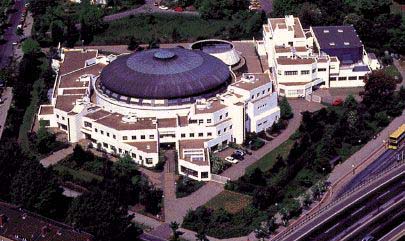Personal tools
News from ICTP 102 - Commentary

ICTP is leading an effort to help ensure that skilled scientists and technicians are available when the SESAME project is up and running.
Two Steps Closer

BESSY I near Berlin, Germany
Not all of the news coming from
the Middle East is as bad as the daily reports we read and hear
about. Life does go on--and, in some instances, progress is being
made toward a better future.
In science the greatest hope for the region lies in the SESAME
(Synchrotron-light for Experimental Science and Applications in
the Middle East) project. The aim is to eventually install in
Jordan a decommissioned synchrotron light facility, BESSY I, previously
located near Berlin, Germany (see photo above).
The German government has donated the facility for reconstruction.
The expectation is that once it is up and running, BESSY I could
become a focal point for scientists and technicians from countries
throughout the Middle East--much the same way as CERN (European
Organization for Nuclear Research) in Switzerland has served as
a gathering place for European scientists since the 1950s.
Last May, the project, which had been spearheaded by Herwig Schopper,
former director general of CERN, was officially placed under the
wing of the United Nations Educational, Scientific and Cultural
Organization (UNESCO). That should make it easier to raise the
funds necessary to rebuild the facility at the chosen site of
Allaan, about 30 kilometers from Jordan's capital city Amman.
This past June, UNESCO arranged for the shipment of BESSY I, which
had been disassembled and placed in storage in Germany. BESSY
I has now been relocated to a warehouse in Jordan's Zarqa Free
Zone, awaiting its next and hopefully final move to its new home.
The project carries both scientific and political importance.
Access to synchrotron beamlines will foster cross-disciplinary
research in physics, chemistry, biology and materials science,
enabling scientists from countries throughout the Middle East
to work together on challenging questions that should help advance
science throughout the region on many fronts. At the same time,
the environment of co-operation and interaction created at BESSY
I may provide an opportunity for promoting peace in a region that
has been plagued by distrust and violence for too long.
ICTP has been involved in the SESAME project since its beginning.
The Centre's focus has been on training scientists and technicians
who can then work at the facility once BESSY I is re-assembled
and operational.
"It's an important opportunity for the Centre," says
Massimo Altarelli, head of the ICTP group on synchrotron radiation
related physics, and science director of Elettra, Trieste's
synchrotron radiation source based in AREA Science Park.
"ICTP's SESAME training committee has received applications
from scientists and engineers throughout the Middle East. Those
chosen not only attend training activities in Trieste but have
a chance to work in synchrotron radiation facilities throughout
Europe. As a result, the effort boosts co-operation among scientists
and engineers both in the Middle East and Europe. And since the
International Atomic Energy Agency (IAEA) in Vienna is helping
to fund and arrange the training activities in Trieste, it helps
to draw the Centre and the Agency closer together too."
The ultimate goal is to enable scientists and engineers acquire
state-of-the-art knowledge and skills in electronic control systems,
vacuum technologies, accelerator physics, and applications in
radio frequencies that can be used both in synchrotron physics
and, more generally, advanced communications systems.
So far three applicants have been chosen for training in Trieste:
two from Jordan, each of whom has received a three-month contract,
and one from Pakistan, who has received a six-month contract.
The costs for the training will be covered by IAEA, which will
work with the Centre to secure funds for additional fellowships.
Both the overall SESAME project and the ICTP-led training component
are strongly supported by King Abdullah of Jordan, whose country
is hosting the facility. SESAME's other members are Bahrain, Egypt,
Greece, Iran, Israel, Morocco, Oman, Pakistan, the Palestine Authority,
Turkey, and the United Arab Emirates.
The SESAME project itself will not gain official legal status
until at least six members approve the statutes and begin paying
their dues. Meanwhile, the hoped-for opening of SESAME has recently
moved two steps closer to reality with the transfer of the facility
from Germany to Jordan and the launching of the ICTP-led training
programme.
For additional information about ICTP's SESAME training
programme, please contact the SESAME Training Committee, c/o ICTP,
Strada Costiera 11, I-34014 Trieste, Italy; fax +39 0402240410.